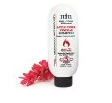As an Amazon Associate ShampooTree earns from qualifying purchases.
What’s the Best Natural Shampoo?
The definition between ‘Natural’ and ‘Organic’ when it comes to consumer products has been very confusing to the American consumer especially when the products are from the same company. Even when it comes to shampoos, the definition between natural and organic can be blurred and consumers need to be aware of the differences between the two.
Organic shampoos are often quite expensive and come in smaller quantities than natural or conventional shampoos. However, the buyer may not want to buy conventional shampoos with their harmful chemical but cannot afford organic shampoos, and therefore may opt for natural shampoos whose price range is in between the two. When looking for the best natural shampoo, there are several characteristics you have to look out for that distinguish this type of shampoos from the others.
Ultimate Natural Shampoo Guide
| Name | Features | Rating | |
 | Tru Moroccan Argan Oil Shampoo | -All Natural -Organic Argan Oil -Chemical Free -Normal, Dry, Damaged, Weak Hair | 4.9 |
 | Andalou Naturals Argan & Sweet Orange Shampoo | -All Natural -No phthalates, -Chemical Free -No synthetic fragrance, colors, preservatives -All Hair Types | 4.8 |
 | Fundamental Shampoo | -All Natural -Organic Ingredients -Chemical Free -All Hair Types -Safe for Color Treated Hair | 4.4 |
 | Sage Shampoo | -All Natural -Organic Spikenard -Chemical Free -Safe for Color Treated Hair -Treats Dry, Flaky, Dandruff conditions | 4.3 |
 | Morrocco Method Apple Cider Vinegar Shampoo | -All Natural -Raw -Vegan -No Chemicals -All Hair Types | 4.2 |
 | Nature's Gate Herbal Daily Cleansing Shampoo | -All Natural -Yarrow Extract -Jojoba -Chemical Free -All Hair Types | 4 |
How Natural and Organic Shampoos Differ
Organic Shampoo – In the United States, luckily there is a clear separation between what can be defined as Organic. The definition put in place by the US Department of Agriculture (USDA) clearly defined as products that are free of artificial additives either as base oils, active ingredients or preservatives. The definition can also expand to include that the natural ingredients used should have been grown under ‘organic’ conditions that is free of artificial fertilizers, pesticides or any chemicals that could harm the environment. In the past, the definition of organic was limited to products only being made of organic products with no mention of how they are grown. Today, the expanded definition is being applied especially in the US and other parts of the world where products grown using artificial chemicals are being shunned by the public. For a product like a shampoo to be defined as ‘Organic’ it must have at least 95% organically produced and processed ingredients. Products with less than this percentage can only list their product as “With Organic Ingredients”, while those with less than 70% of their ingredients being Organic cannot be listed as Organic products. Certified Organic products usually have a USDA Organic Seal.
Natural Shampoo – Natural on the other hand has not been defined by Law in the United States except for meat products and can mean a wide variety of things These include:
- Products that have all their ingredients being natural but not all of them being organic. Some volumizing shampoos have sea salt in them. Sea salt in a natural product but it is not organic thus the product would be defined as ‘All Natural’ but not organic if the inorganic ingredients are more than 5% in the product.
- Products that have several artificial additives (Including harmful ones) but have one major ingredient, usually either as the active ingredient or as the base oil in addition to the fragrance. This as a marketing technique that is being used by makers of conventional shampoos where a single natural ingredient such as Aloe Vera is added to the other ingredients so as to make the product appear more natural or even organic to the consumer. It is always wise to read the ingredients and look at the percentage of natural as compared to the artificial additives.
- Products using chemicals derived from natural products but due to the various processes they have been subjected to, are not considered organic but do fit the definition of natural due to their origin. Such chemical usually have no harmful side effects and for the most part, are beneficial to you. Shampoos containing such chemicals are actually the most common natural shampoos in the market. Examples of such chemicals include citric acid which is derived from citrus fruits, sodium laureth sulfate(not to be confused with sodium lauryl sulfate) which is derived from coconuts and glycol distearate which is a derivative of stearic acid, a fatty acid found in vegetable oil are a few examples of such ingredients.
Watch the following video to learn about 5 Amazing Elements found in Morrocco Method Shampoos.
Key Factors to Consider When Buying a Good Natural Shampoo
- Ingredients – If you decide to buy a natural shampoo instead of an organic one, then more attention has to be paid to the ingredients contained in the natural shampoo. It is wise to avoid natural shampoos with sodium lauryl sulfate which dries out the hair and leaves it damaged. Other toxic additives to be avoided include Dioxane, Propylene Glycol, Diethanolamine and Monosodium glutamate. In order to determine whether the shampoo is a natural shampoo or a cleverly disguised inorganic shampoo, compare the ratio of organic versus inorganic ingredients listed and if possible, their concentration which is listed on some brands.
- All Natural Label – The best natural shampoo brands have the all natural label which means that all the ingredients used are natural, whether organic or inorganic. Of course you have to check the ingredients first to ensure that none is an artificial additive but if verified to be authentic, these are the best shampoos to use as you are not exposed to any harmful chemicals.
- Research – Due to the difficulties in distinguishing companies that make natural, conventional and inorganic shampoos, the consumer has to do plenty of research on which products are natural and which ones are not. Today, a large number of organic shampoo manufacturers also manufacture natural shampoos thus one has to research further into which specific product is natural.
- Hair and Scalp Type – Like all shampoos, there are natural shampoos manufactured with a specific hair type in mind. Normal hair type shampoos are mild and have natural ingredients that have a balanced effect on the hair and scalp. Dry hair shampoos have a natural oil base which is ideal for trapping moisture on the hair and scalp ,thus keeping the hair soft and smooth and preventing dandruff. Oily hair shampoos have natural ingredients like tea tree which absorb oil from the hair and scalp thus drying it out. Both Dry hair and oily hair shampoos should not be used in excess as they would lead to oily hair and dry hair respectively.
- The Oil Base – Natural shampoos, just like organic shampoos, always have a natural plant oil base like coconut oil, shea butter, jojoba and olive oil. Others may have a mix of these oil bases.
Advantages of Using Natural Shampoos
- They are less harmful as compared to commercial shampoos. Exposure to harmful chemicals is kept to a minimum and as for the all natural one, there is no exposure to harmful chemicals at all.
- They are a stepping stone to buying organic products. Most customers, after getting unsatisfactory results with commercial shampoos, begin their journey with natural shampoos and when they find them satisfactory but want more, move on to organic shampoos.
- There are many ingredients found in organic shampoos that are also found in natural shampoos like Vitamin E, Aloe Vera and Soy protein and they provide the same benefits to natural shampoo users as organic shampoo users.
- Natural Shampoos stimulate the growth of new hair by having a combination of organic and natural ingredients which stimulate the hair follicles while keeping the environment around the follicles clear and balanced.
- Longer lasting Hair. By minimizing toxin exposure to the hair, the hair stays healthy, long and damage free.
Natural Shampoos are available both online and offline in your local health stores. As mentioned previously, A large number of Organic shampoo manufacturers also manufacture natural shampoos either as a method of product diversification or to provide customers with a cheaper option to organic shampoos while hoping that once the customers get favorable results from natural shampoos, they will be more willing to explore organic shampoos.
Other organic shampoo manufacturers such as Organics, Acure, Aubrey and Max Green Alchemy also have some of the best natural shampoo products for those wishing to buy them.





